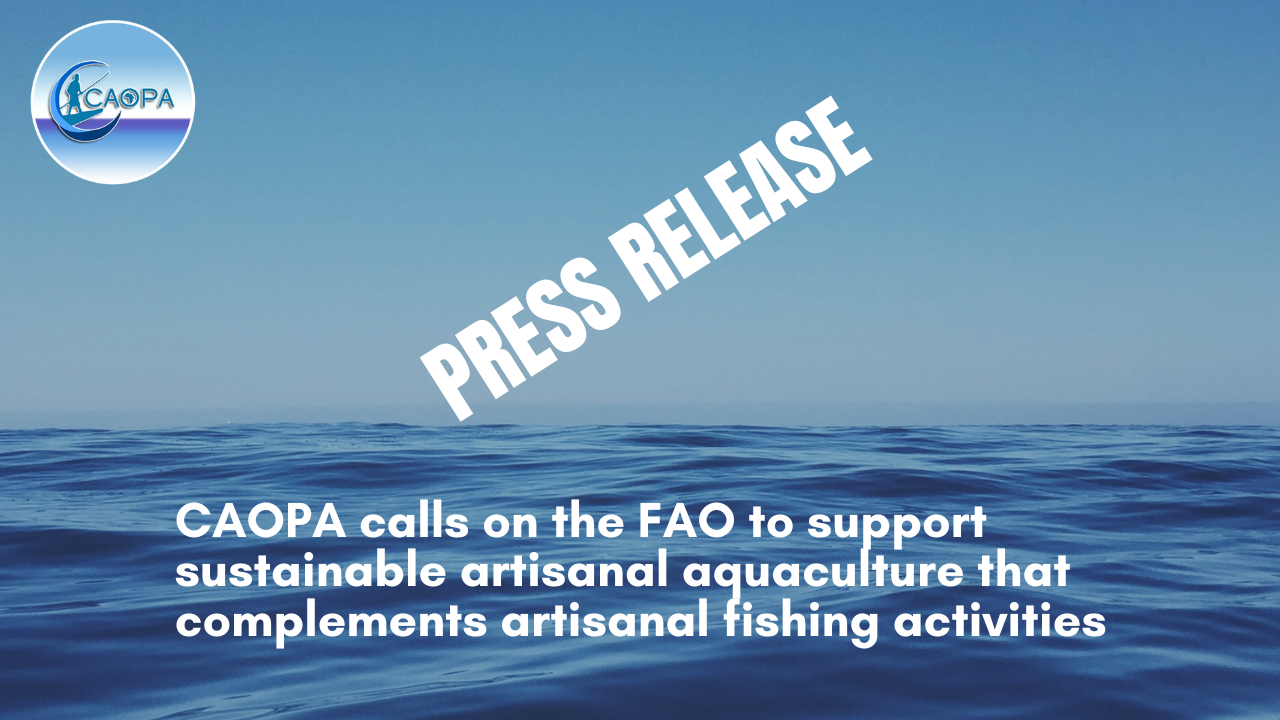PRESS RELEASE
Mbour, 30 November 2022 – The African Confederation of Artisanal Professional organisations (CAOPA) brings together professional organisations from 27 African countries.
On the occasion of the International Year of Artisanal Fisheries and Aquaculture (IYAFA), CAOPA organised on 26 and 27 October 2022, in Senegal, an exchange workshop on the development of “sustainable artisanal aquaculture complementary to artisanal fisheries activities in Africa“. The workshop, supported by Bread for the World (BfW), the Swedish Society for Nature Conservation (SSNC), the Coalition for Fair Fisheries Arrangements (CFFA), OAK Foundation, brought together about fifty participants, including thirty African artisanal fisheries professionals (fishermen, women fishmongers and processors), research institutions, Civil Society Organisations (CSOs), as well as representatives of the FAO and the Senegalese authorities.
With a view to the FAO Sub-Committee on Aquaculture meeting early next year, CAOPA was keen to share with this entity the recommendations resulting from the workshop, asking for them to be taken into account in the Guidelines for Sustainable Aquaculture under development.
At the October 2022 workshop, participants identified the following challenges and recommendations.
CHALLENGES
Participants recalled that intensive aquaculture dependent on fishmeal and fish oil, some of which is produced in West Africa from overexploited resources (such as round sardinella), in direct competition with artisanal fisheries that fish for human consumption, cannot be considered sustainable, either environmentally or socially.
In West Africa, the establishment of fishmeal factories that use small pelagic fish as raw material is causing a series of problems, the main one being the overexploitation of these shared resources: in the region, scientists have observed a 74% decrease in round sardinella landings since 2020. To this must be added the problems of air and coastal water pollution. It should also be mentioned that the overexploitation of small pelagic fish, which are the basis of the diet of other fish caught by artisanal fishermen, is weakening the entire eco-system. According to the scientists present at the workshop, ‘The current state of small pelagic stocks, of which the sardinella is already in a very worrying situation, requires special attention to avoid their collapse’.
“In Africa, we need sustainable artisanal aquaculture that complements the activities of small-scale fisheries,” says CAOPA.
Artisanal aquaculture, complementary to artisanal fisheries, can however help fishing communities to address some of the challenges. In particular, it is important to note the vulnerability of women who have difficulties in obtaining fish for processing, in the face of overexploitation of resources, stiff competition from fishmeal factories and also from pelagic freezing and export units. Artisanal aquaculture can provide women with an alternative income generating activity that also improves their supply of fish as raw material for processing. During the workshop, positive experiences were shared from the Democratic Republic of Congo (DRC), Mali and Côte d’Ivoire.
RECOMMENDATIONS
To address the challenges facing the sub-sector, participants proposed the following actions:
- Develop strategies for fishmeal substitution in artisanal fish feed:
Develop research to enable local waste to be exploited and valorised for fish feed; support the installation of local feed manufacturing units;
- Promote alternative activities such as fish farming with an integrated market gardening system
Allocate land to women fish processors by local authorities to develop alternative activities; Encourage and popularise family fish farming integrated with other plant and animal production activities; Develop new income-generating activities such as seaweed and spirulina farming
- Supporting small-scale fisheries actors in their projects
Strengthen the technical capacities of actors in artisanal fisheries and aquaculture; make good quality fingerlings available; support actors in financing their projects;
- Promote the use of local and accessible equipment and infrastructure; Facilitate the integration of women and men from artisanal fisheries who wish to develop fish farming activities.
Mamadou Aliou DIALLO
Communication officer
E-mail: caopacom@gmail.com
Telephone: +221 76 600 80 41


